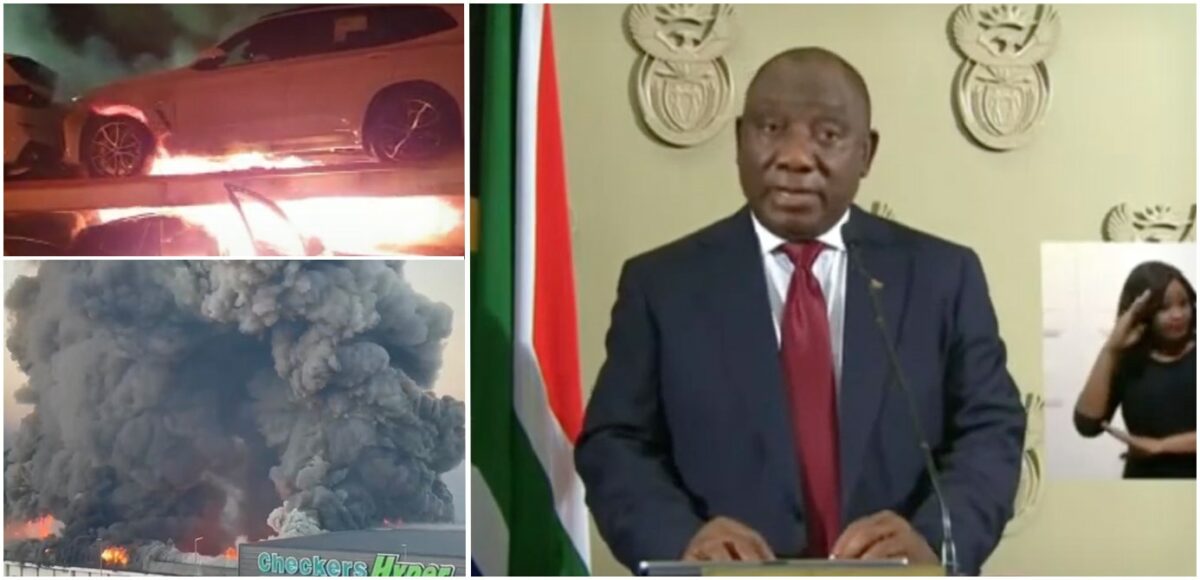On Monday 12 July 2021, South Africa reached a turning point as a nation when a wave of unrest erupted following the arrest of former President Jacob Zuma. The riots begun as a #ShutdownSA rally in protests against the arrest of the former President but quickly spiraled, turning into a looting spree that crippled parts of KwaZulu Natal and Gauteng resulting in fuel and food shortages as major supply routes were blocked.
These protests shuttered 161 malls, 11 warehouses, 8 factories and 161 liquor outlets and distributors. To aggravate matters, 50 schools in KwaZulu Natal were vandalized in the process. It is estimated that the damage caused on the first day cost retailers 2 billion rand. The week of chaos resulted in the deaths of over 200 people, leaving key industrial infrastructure torched and trade routes blocked. The South African Police Service (SAPS) struggled to contain the violence in Durban and Johannesburg, leaving residents, community forums, private security companies and taxi bosses to protect their communities. This crisis along with the rising crime and security concerns has created a spike in South Africans seeking secondary residency and citizenship programs. Accessible options for these individuals include countries like St Lucia, Antigua, Grenada, St Kitts and Nevis, while those more affluent consider countries such as Portugal, Malta, Spain, Italy and Belgium. It is worth noting that 4,200 super-wealthy South Africans have already left the country since 2010.
This latest wave of riots in the country were notably additionally fuelled by the country’s poor socio-economic conditions, as South Africa battles with poverty, unemployment and inequality. According to Statistics South Africa, the country had an unemployment rate of 32.6% for the first quarter of the year and has been named the most economically unequal society in the world by the World Bank. The country’s economic incoherence in terms of its ideas, strategies and plans contributes towards the existing structural challenges. South Africa needs to move beyond ideological debates, self-interests and factional contests. It is clear that the state cannot resolve these structural issues on its own, therefore, there should be a move towards collaborative development that works. This means finding hybrid arrangements that work. Multi-sector collaborative development and/or hybrid arrangements are not an unrealistic notion and can work if implemented correctly. The country’s unreliable electricity supply can be assisted by independent power producers as well as an increase in the current electricity generation license threshold. Government can sell half its shares in troubled State-Owned Enterprises (SOEs) to citizens. Private ownership may improve the operational, financial and governance challenges in SOEs, freeing government of its existing debt. This is just the tip of the iceberg as much needs to be fixed.
In the interim, government needs to act decisively with looters and instigators to restore law and order. The culture of impunity needs to end. Government needs to investigate its security apparatus, make better appointments and remove those with checkered histories. It needs to ensure that those appointed in its security apparatus are capable of dealing with issues such as wanton looting in a timely manner to minimize the impact on people, communities, the economy and society.
Current development policies need to be revisited, advice from experts should be sought and implementation should be prioritized. There is no point in having good policies that aren’t implemented well. Policing in the country needs to be beefed-up and police stations need to be adequately resourced to ensure that justice prevails. The judicial system needs to be tougher in dealing with criminals, as criminality has no place in a civilized society. Instead a culture of accountability, responsibility and good citizenship should be encouraged so that future generations can do better because they know better. A good place to start is for President Ramaphosa to weed out the deadwood from his own cabinet. After all, issues of accountability and taking responsibility should start at the top.

